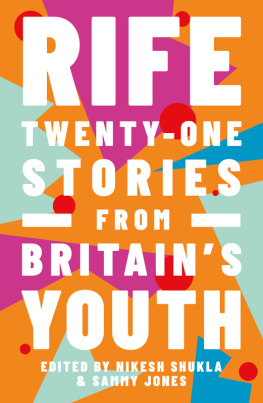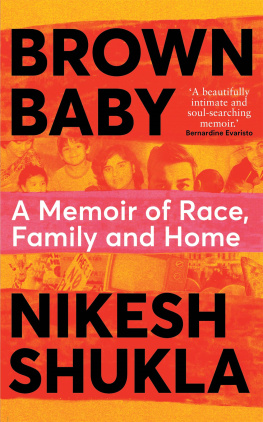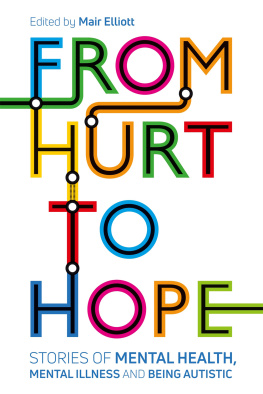
For all our Rifers past and present: Shanai, Ryan, Jon, Adibah, Molly, Jess, Sham, Hal, Yero, Leo, Jack, Cai, Antonia, Grace, Ailsa, Aisha, Jazz, Holly, Kaja, Barker, Imogen, Euella, Alexie, Mikael, Ella, Tim, Lily, Asmaa and Sumaya.
CONTENTS
Alex Diggins
Liv Little and Charlie Brinkhurst-Cuff
Kaja Brown
Ailsa Fineron
Olivia Fletcher
Ella Marshall
Rosalind Jana
Malaka Sargeant
Chlo Maughan
Katie Oldham
Shona Cobb
Mariam Khan
Ilyas Nagdee
Chloe Kitching
Ellie Ford-Elliott
Aniqah Rawat
Brandon J. Graham
Amber Kirk-Ford
Brenda Wong
Nicholas Preston
Tom Greenslade
NOTES FROM THE EDITORS
In February 2014, I started work on a new magazine, funded by Bristol Youth Links and commissioned by Watershed, that was designed to amplify the voices of young creatives in Bristol. We were to create a space for them to tell stories and make films about the things that were important to them. We did this through six-month paid internships, stressing that they didnt need experience and they didnt need a degree. They just needed to have ideas and enthusiasm. Wed help them find their voice.
In the first team, Adibah, in one of her first pieces, wrote about the gentrification of an area in Bristol called Stokes Croft, which generated a lot of online discussion. We had arrived. I was impressed by how political she wanted to be. I hadnt expected that. I didnt know what the teams would want to cover probably pop culture stuff and the occasional political thing. But there she was, bringing social issues to the forefront of what became Rife magazine.
We called ourselves Rife because we wanted to give the impression that we were everywhere. Through the years I worked on the project, we produced thousands of pieces of content, gaining us over a million views across all platforms, and I trained up just under thirty young people as well as commissioning hundreds more. It was the best time of my life because it directly challenged what I thought young people cared about. It made me realise what I had missed out on when I was young. This isnt a I believe the children are our future editors note. No. Its more than that. This country has repeatedly gone against the wishes of young people for decades. And a whole new politicised generation, coming up around the time of the tuition fees protests, have social media, all to arm themselves by giving them a space to come together.
Were going to get to a point where the country has moved so far away from what young people want they are playing catch-up, and the stress point will test the fabric of what we consider important. This book is about the cracks starting to form.
Nikesh Shukla, Summer 2018
When I did my Rife internship, I didnt know how important it was, to be honest. Plucked from my supermarket job, I was overwhelmed by the power handed to me by Watershed. They trusted me to write (and make very bad videos) about what I was passionate about, and they let me use their sizeable platform to shout about my thoughts and feelings to a national audience.
Now Im one of the editors of Rife , I have a more in-depth view of the project. Im trying not to be too cheesy, because when it comes to Rife Im prone to gush but to me it seems more remarkable every day. Young people simply do not see themselves reflected in traditional media (note the staggering decline of print papers, in which all you get are caricatures of kale-scoffing millennials and square-eyed Gen Z-ers). The young people I work with are alarmingly switched on to a world where they arent properly represented. Theyre willing to think and reflect on big issues, and they really care about our country, however frustrated they get with it. They want to make the world better theyre just not being given the tools to make change. I hope Rife can act as a space to think about and express their views in a way that feels natural. That feels like a vitally important tool.
Because the world is, undeniably, pretty bleak for the average young person. When I think of having to live through this era, I feel an overwhelming instability. Ive spun through rented flats, shared houses and rubbish jobs far faster than my parents did, and thats a national trend. My mental health has been rocky to say the least, and working that out over the past ten years through the NHS has been a challenge. But where there are massive gaps in the infrastructure that should be supporting us, I am surrounded by hope. I look around me and I see young people making it work against all odds, gathering strength by leaning on each other and forging their own outlets zines, websites, books, even tweets that breed optimism.
By showcasing these inexpressibly talented young writers, tackling twenty-one different topics that mean something to them from gentrification to dating, and from the horrors of university to disability rights I hope that this book can be a source of such hope, too.
Sammy Jones, Summer 2018
GENERATION SPENT: BRITAINS
RENTAL CRISIS
Alex Diggins
For me, as for many others, the troubles began with an email. Dear Mr Diggins, it read. As you know, your initial tenancy agreement is due to expire in two months time. Therefore, we require you to pay outstanding fees of 2,600 for the next six months. If you do not make payment by 14 February [at that point, two weeks time] we will unfortunately be forced to serve notice. Yours, Bristol Residential Lettings.
Reading those words, my emotions shuttled quickly through shock, bafflement and, finally, to anger. The whole situation, and the threat of eviction, seemed completely unwarranted and absurd. When I finished university, after a brief, tedious period stuck at home in a small Devon village, I had decided to move to Bristol. Unlike so many of my friends, I was dubious about the bright lights of London; Id heard far too many horror stories of graduates exploited at work as barely paid interns and at home by landlords who charged exorbitant rents for minuscule scraps of living space. I didnt want to be a part of that world. I was also realistic about my chances of making it as an aspiring freelance writer I knew Id have to pull a few pints and whip up some mean flat whites along the way to becoming a swashbuckling combo of Hunter S. Thompson and Tom Wolfe. Bristol seemed (just) cheap enough to sustain this lifestyle whilst also offering some of the same big-city attractions.
I moved without hesitation. When I arrived, though, this meant I didnt immediately have permanent work in place, which made renting a little difficult; letting agents are surprisingly reluctant to let to underemployed graduates, no matter how nuanced their understanding of Old English poetry. But my friends and I found a place eventually I was allowed to move in on the condition I paid six months rent upfront. This seemed fair enough, given my uncertain employment status, and I duly dug into my savings. Four months into the tenancy and all was going fine: Id found a part-time job working at a publishing company, and I was writing and teaching in my spare time. The hurdles of adulthood that had seemed so unconquerably high housing, employment, security were, if not entirely surmounted, a little more in reach. Until, that is, that email arrived and the bottom dropped out of my world. I was plunged into a Kafkaesque nightmare of eviction threats, legal counsel, and fighting daily to maintain a roof over my head, where the mere fact that I tried to argue my case put me in danger of going to court and losing my home.
The letting agent maintained that I owed them another six months rent in advance; I countered that as I now had a stable job, there was no need for this condition. Besides, I didnt have nearly 3,000 lying around, and paying them upfront again would mean taking out a loan: a very stupid financial decision. Most damningly though, there was no legal justification for their demands under Section 5 of the Housing Act 1988, the tenant has the right to remain in the property after the initial tenancy agreement has run out. Thereafter, unless either the landlord or the tenant wants to cancel the agreement, it is assumed the tenancy continues as normal and the tenant pays on a periodic (monthly) basis. I felt then that my desire to pay rent on a monthly basis (incidentally, just like the rest of my flatmates in the house) was, therefore, entirely reasonable, legal and just. By contrast, Bristol Residential Lettings threatening demands that I pay another six months rent in advance seemed baffling why did it matter how I paid the rent as long as I did pay? and decidedly dubious from a legal perspective.
Next page









